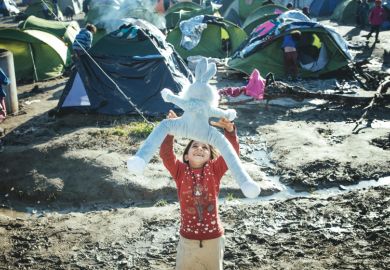It started with a question. Students at the University of Hertfordshire had gathered to hear about the creation of an exhibition on the subject of refugees, for the charity Breaking Barriers. One of the students, tearful at the story of a youth who’d been tortured before escaping family-less and penniless to London, asked what we could do to help refugees already here.
What if, I suggested blithely to Matthew Powell, the CEO of Breaking Barriers, our vice-chancellor could be persuaded to offer scholarships? Matthew was non-committal. Several universities had scholarships but finding students to fill them was hard, and finding those who had sufficient grasp of English was harder. However, University of Hertfordshire colleagues had just started a staff-student group to help refugees, and they were enthusiastic.
I thought that the hardest part would be persuading the vice-chancellor to shoulder the cost. But I felt that if we could present him with a profile of the actual refugees we would be helping, that would be harder to turn down. My colleagues agreed.
In hindsight, the persuading was the easy bit. The pitfalls were finding the refugee, and then navigating the Kafkaesque bureaucracy. With the confidence of the clueless, I started a ring-round of local councils. Everyone had refugees, everyone wanted them to have a free place at university, all of the potential candidates were utterly unsuitable. “She’s very enthusiastic,” said one council worker. “She hasn’t been in education since [she was] nine but she’d love to have a go.”
The most common problem was lack of English. I turned to the Refugee Council with a strict list of criteria. The student needed to have finished high school and had to want to study something we offered; they needed to live within commuting distance; and, most important of all, their English should be at IELTS 6.5, the lowest standard we could accept. They came up with a candidate who had recently escaped from Syria and had been granted refugee status. He had spent a year in university before coming to Britain and was desperate to continue his studies.
A quick appraisal by the staff who teach English to our international students revealed that he didn’t yet have good enough English. But he was not far from the standard required of international students who take our pre-degree academic English course. If the vice-chancellor would fund that as well, there was a very good chance he could take – and more importantly succeed at – the degree.
This is where it helps to have a team. The English language teaching specialists volunteered to give our prospective student free tuition to get him through the first exam. A local refugee group offered to fund his bus fares to the university for those lessons, while our staff group raised more money to help fund living costs. Meanwhile, our admissions team was able to sort out qualification equivalence.
One of the oddest requirements was that he should supply an academic reference. Since refugees are by definition fleeing from persecution, the likelihood of their tutors being able to give them a reference is negligible. How would that have worked out for Jewish refugees fleeing Nazi persecution? Finally, after a paperwork battle of epic proportions, he is now on our academic English course in preparation for his degree this autumn. It is a shame that I didn’t discover there is a national student refugee organisation – STAR – which might have helped with these issues, but we will know for next time.
Our prospective student is enthusiastic, charming and resilient, noting down strange English phrases he comes across and presenting them to us to help him translate. But he is having to come to terms with the trauma of leaving Syria while watching what is happening there on the news. He is here in body, but still partially in Syria in spirit.
He has new cultural mores and expectations to navigate, as well as a host of small stress issues, from finding his way to the right campus, to filling in the daunting range of joining forms, to getting a council tax rebate and even working out what his expectations are. He told me glumly at one meeting that he did not think he could write as well as the journalists on The Times, not even once his English improves.
It has been a learning curve in cultural awareness for me too. One day during the heatwave I rang a teaching colleague to find out how our new student was coping during Ramadan, with day-long English language sessions in equatorial heat, garnished by a long bus ride home. She replied, curtly, that he wasn’t the only student fasting and wilting in the heat.
There will be further challenges as he starts his degree and has to adapt to a system of education that is so different to the one he is used to, studying alongside students whose lives have not been broken by war. But by trying to keep in contact with him, we will be in a better place to help him steer his way through. Then we will start preparing for the next student.
If there’s one thing I have learned, it is that it isn’t enough to offer a scholarship and then just hope something will turn up. If you are going to give someone the opportunity to succeed in an entirely new environment, they need and deserve more than that.
Sharon Maxwell Magnus is programme leader for humanities and principal lecturer in journalism at the University of Hertfordshire.
Register to continue
Why register?
- Registration is free and only takes a moment
- Once registered, you can read 3 articles a month
- Sign up for our newsletter
Subscribe
Or subscribe for unlimited access to:
- Unlimited access to news, views, insights & reviews
- Digital editions
- Digital access to THE’s university and college rankings analysis
Already registered or a current subscriber?







